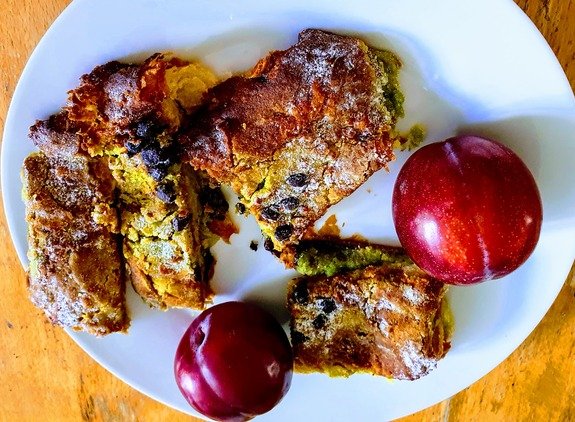I stumble outside the hospice into blinding light - it’s a beautiful summer’s day and the sky is a clear blue. All around me, people are going about their daily lives - meeting friends, drinking coffee, walking on the local beach, chatting away on their phones. The world is spinning on its axis but, for me, it is as if everything has changed irrevocably.
Every step I take is laboured, impossibly difficult, as if I am walking underwater. Is it possible my father is dead? Yes, it must be possible, since I watched him expire before my eyes. Still…I am in disbelief. Surely not. Surely not. There must be some mistake. My father was a larger-than-life figure, a huge man, with broad shoulders and a voice you could hear from a mile away. Surely that cannot be gone? Surely there must be some error?
All around me are people, people who - if they knew of my loss would most likely show me compassion - but I am a stranger to them and a stranger to this town. I must return to London; there, I have friends to comfort me, not to mention clean clothes and access to sedatives.
The first 72 hours that follow my father’s death are nothing more than a blur. I let myself into the London apartment at which I am staying and, on autopilot, feed the cats (who are hungry), water the garden (the plants are drooping), then take a long shower (I feel very dirty). I then climb into bed and sleep, but only for a few hours. This will become the pattern for the coming weeks - when I do manage to sleep, it is brief, fitful, constantly interrupted. Despite my physical exhaustion, I’m waking almost every morning in the wee small hours with a start.
For a split second, all is well with my world but then the horror of my situation hits me like a freight train.
I wander aimlessly in the local park - a park I often came to with my father, as a child - and am numb, disbelieving and despairing. As days pass, and I do not hear from my mother, I understand that my father’s death has caused a massive rupture in our relationship, a rupture which I doubt will ever mend. She and I have never been close but after the acrimonious break-up between her and my father, I feel she resented me even more (probably seeing too much of him in me). The fact that I was at his side at the end, ensuring that he did not die alone and afraid, is something she is clearly never going to forgive me for. Not that I need her forgiveness. A little compassion would be nice, of course, but she’s never been one for giving me that either.
Still, now is not the time to analyse the dysfunction within my family. This I can, and will do, much later. For now, I reach out to my father’s blood family, trying to comfort them and receive comfort in return. His eldest sister is distraught (my father was her favourite brother) her husband saddened, their son subdued. They are shocked at how I have been ‘excommunicated’ by my mother, when my father’s body is not yet in the ground. I am not shocked - I think I always knew this day would come. Not that the knowledge I was correct makes it easier to deal with.
In the meantime, I stare vacantly at my phone, reading messages of condolence that are arriving thick and fast. It is far too difficult for me to respond to them. I purchase food from delis that can easily be warmed up - the idea of cooking a meal is impossible. I pick up books but, after reading a few lines, understand I cannot comprehend the words. I stare at the tv screen, praying that bad comedies will alleviate my despair. They do not.
Shock then turns to grief and, simultaneously, a terrible numbness. I feel utterly frozen, and completely unable to feel any other emotion. I want to cry but I cannot - I go through the days like a zombie. There is only one upside to this - I am so utterly detached, nothing matters.
Inevitably, this does not last. Irritability then sets in and this soon turns to anger. I am furious at anyone and everyone. I have no patience for the slightest thing - a trip to the bank ends in my weeping and staff trying to comfort me. A journey to the post office culminates in me yelling at a clerk and him yelling back. I have to abort a walk around the supermarket, breaking down sobbing, after spying chocolate cake and juicy plums for sale - they were two of my father’s favourite foods!
To compound the agony, my father’s body has not been released by the coroner, for reasons no-one knows. I learn that the coroner is a legal authority and the deceased’s family are not at liberty to question this decision. So, as things stand, my father is trapped in a freezer until some faceless official signs a piece of paper, at which time his body can be dispatched to undertakers and a funeral can be arranged.
This means that, in turn, I am ‘trapped’ in London. I have never felt more desperate to return to the country I consider home - Israel - but, clearly, it would be unwise to leave town. And so I sit, willing the days to pass until permission is given for my father’s body to be released. Finally, a date is set - all in all, it will be almost five weeks until he is cremated. I am too exhausted to fly home then return again so now It’s nothing more than a waiting game.
I take long walks along the Thames, play hundreds of games of online poker and lay on the sofa at my friends’ loft (they are holidaying in the south of France), watching reruns of ‘Little House on the Prairie'. I am deep into an two-episode story of young Laura Ingalls’ romance with Almanzo when the phone rings. It is my friend, Kathy.
“Switch on the news,” she tells me. “They’re saying the Queen is gravely ill…


